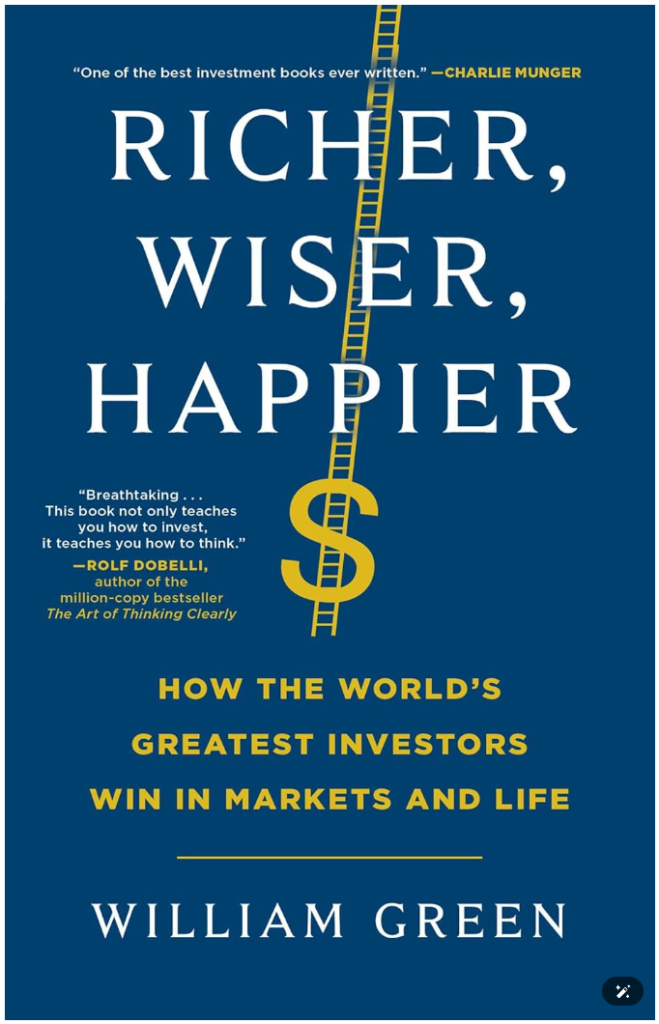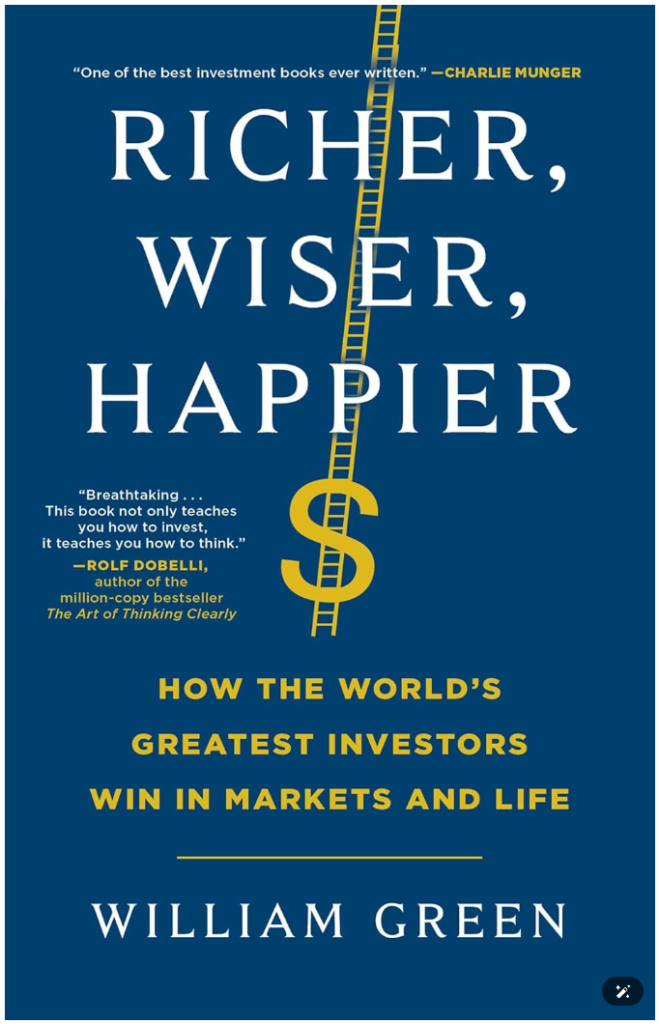How the World’s Greatest Investors Win in Markets and Life
Investing can seem attractive because it offers the chance to earn money without the usual hard work. Many people dream of quitting their jobs and becoming their own bosses through wise investments. While making money is certainly a key goal, there’s more to investing than just the financial gains. By improving your chances for success, you can also become wiser and happier.
This article explores important lessons from some of the best investors in the world. You will discover strategies that can help you think differently about investing and life. By learning from successful figures and focusing on long-term goals, you can enhance your decision-making skills and navigate uncertain markets more effectively.

Takeaway 1: Imitating Successful Investors
Copycat Strategy
Investing can be a smart way to build wealth, but you don’t always need to reinvent the wheel. Many successful investors have gained their edge by observing and mimicking those who have already found success. A prominent example is Mohnish Pabrai, who achieved returns above the market average simply by copying strategies from successful investors. He follows their moves closely and learns from their decisions instead of trying to develop his own unique ideas.
The Wisdom of Warren Buffett
Warren Buffett is a key figure in the investing world and one that many aim to emulate. When Pabrai started his investment journey, he noticed that not many fund managers were adopting Buffett’s successful strategies. Pabrai embraced this opportunity, studying Buffett thoroughly and applying his principles to his own investments. He even invested in a lunch with Buffett to gain deeper insights, demonstrating the value of learning directly from the best.
Benefits of Modeling the Greats
Learning from successful investors can make you wiser and help you avoid common pitfalls in the market. By modeling the strategies of those who excel, you can improve your own decision-making and increase your chances of success. This approach isn’t limited to investing; it can be applied to various fields. Striving to learn from the best can lead to greater achievements and help you become a better professional in any area you choose.
Takeaway 2: The Strength of Inversion
Charlie Munger’s Method
Charlie Munger often says, “All I want to know is where I’m going to die so I’ll never go there.” At 99 years old, he has valuable insights about thinking differently. Inversion means flipping a problem upside down. Instead of asking how to succeed, consider how to fail. This shift in thinking can help you avoid mistakes and make better choices.
Avoiding Bad Investments
To find great investment opportunities, start by focusing on what you don’t want. Ask yourself, “How can I avoid bad investments?” Think of the stock market as a block of marble. By removing poor choices, you can reveal profitable ones. To begin, eliminate investments that fall outside your area of expertise. Next, discard companies with dishonest or incompetent management. Lastly, consider whether the business has long-term potential and make sure to buy at a reasonable price.
Selective Investing Criteria
Successful investors often set clear criteria. They look for features like:
- Understanding: Only invest in what you can comprehend.
- Management Quality: Choose companies led by capable and trustworthy leaders.
- Long-Term Viability: Assess whether a business will thrive in the next decade.
- Price Consideration: Aim for a cost-effective entry point; for instance, many investors avoid purchases with a price-to-earnings ratio above 12.
Being selective helps you build a stronger portfolio by focusing on the best possible options available.
Takeaway 3: Focus on the Ultra-Long Run
Nick Sleep and Zack’s Approach
Nick Sleep and his partner Zack launched their Nomad Investment Partnership on September 10, 2001. Despite starting in a challenging market environment, they achieved remarkable success. Over 14 years, they outperformed the MSCI World index by around 800 percentage points. Their key strategy is to emphasize the ultra-long run in investing.
Lasting Investment Information
Sleep believes that all information has a limited use period. He prioritizes learning that remains relevant for the long haul. Unlike many investors on Wall Street, Sleep and Zack do not focus on daily price changes. They avoid distractions by keeping their expensive Bloomberg Terminal out of reach, allowing them to concentrate on valuable research, such as annual reports and management interviews.
Cultivating Strong Relationships
They implemented a fair fee structure, earning only when their investors profit. This method helped build strong personal connections with their clients. Studies show that good relationships contribute to happiness and well-being. In a market that often seeks quick gains, investing for the long run allows for less competition, increasing the chances of success.
Takeaway 4: Making Choices When Things Are Uncertain
Howard Marks on Acknowledging Our Boundaries
You must recognize your limits when making decisions, especially in investing. Howard Marks emphasizes that being honest about what you don’t know is crucial. It’s important to avoid overconfidence. Accepting that uncertainty exists helps you make more informed choices. This approach allows you to focus on what you can control and understand.
The Need for a Strong Foundation
Creating a reliable decision-making framework is essential. Without it, you might feel lost in uncertain situations. A solid framework helps you analyze risks and opportunities systematically. It guides you through complex situations by providing clarity. By relying on this structure, you can improve your decision-making process.
Key Insights
Investing can provide a way to generate wealth without the traditional grind of a 9-to-5 job. Many people crave financial freedom. Yet, focusing solely on monetary gain misses a broader truth: successful investors enhance their chances of winning in both financial markets and life. This mindset leads not just to wealth but also to wisdom and happiness.
1. Emulate Successful Investors
To thrive in investments, look to those who have proven successful. Mohnish Pabrai exemplifies this by mirroring Warren Buffett’s strategies, which has allowed him to outperform the market. He studied Buffett’s methods thoroughly and adopted similar practices, making a smart decision to learn from a master rather than relying solely on his own ideas.
2. Think Backwards
Consider the concept of inversion, as suggested by Charlie Munger. Instead of asking how to achieve success, ponder what actions could lead to failure. By understanding what not to do, you can avoid poor investment choices. This method often involves eliminating bad options, managing risks, and choosing companies with strong fundamentals at reasonable prices.
3. Long-Term Focus
Nick Sleep and his partner Zak achieved significant success by concentrating on the long term. They ignored short-term price movements and focused on sustainable growth and firm fundamentals. By establishing healthy relationships with investors based on mutual success, they maintained happiness and satisfaction.
4. Decision-Making in Uncertainty
Investing requires navigating unpredictability. Acknowledge your limits and make informed decisions despite uncertain outcomes. Understanding the complex nature of markets allows you to manage risk effectively while making choices that can lead to profitable outcomes.
For more book about Business & Money click here
Lern more about THE PSYCHOLOGY OF MONEY (Morgan Housel)

Leave a Reply